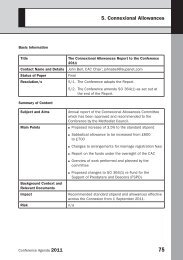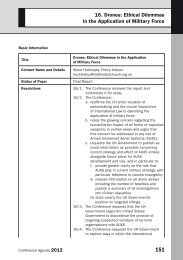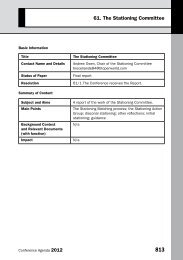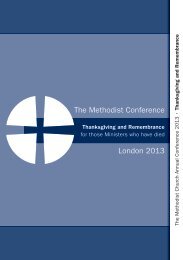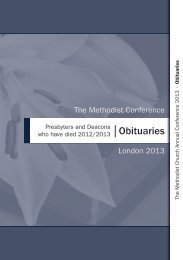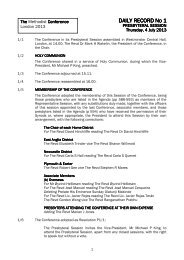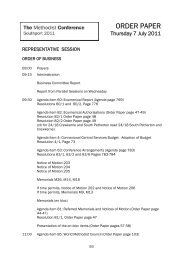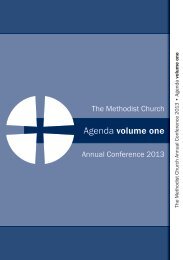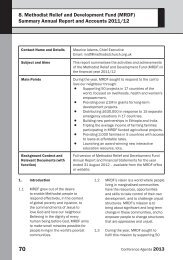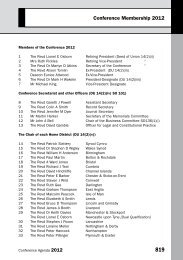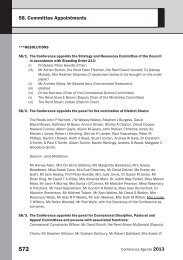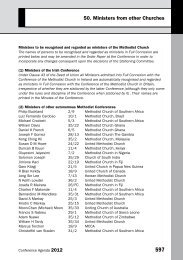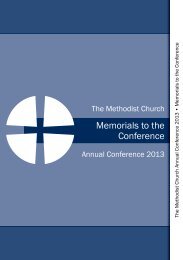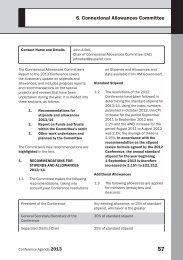Agenda Volume 3 - Methodist Conference
Agenda Volume 3 - Methodist Conference
Agenda Volume 3 - Methodist Conference
You also want an ePaper? Increase the reach of your titles
YUMPU automatically turns print PDFs into web optimized ePapers that Google loves.
59. Memorials to the <strong>Conference</strong><br />
taxation while also maintaining their skills<br />
and dignity) or be entitled to claim benefits<br />
if unable to obtain employment.<br />
In the meantime, with regard to the current<br />
situation, we request the <strong>Conference</strong> or<br />
the Connexional Team to make changes<br />
to <strong>Methodist</strong> policy in order that manses<br />
and other property may be used to offer<br />
hospitality to those without funds and for<br />
other mission purposes (which may not<br />
obtain market rent) in keeping with SO<br />
929(2)(iv).<br />
Reply<br />
The <strong>Conference</strong> thanks the South<br />
Bedfordshire Circuit Meeting for raising<br />
these matters, as the issue of destitution<br />
amongst asylum seekers is one of great<br />
concern to the many churches who work<br />
with those seeking asylum.<br />
An asylum seeker is someone who<br />
has left their home country for fear of<br />
persecution and has made a claim for<br />
protection, but whose claim has not been<br />
decided yet. During this period they will<br />
normally receive accommodation (often<br />
sub-standard) and cash support (£36.62 a<br />
week for a single person) while their claim<br />
is being investigated. If they are refused,<br />
this support is ended for couples without<br />
children or single people and they are<br />
evicted and left without an income.<br />
At this point they may qualify for ‘Section<br />
4 support’ which, provided they agree<br />
to return home as soon as the UK<br />
government says it is safe to do so,<br />
consists of accommodation and a payment<br />
card to spend in a limited number of<br />
shops. If a person has been waiting<br />
for 12 months and has not had their<br />
initial case decided, they may request<br />
‘permission to work’, but only take up a job<br />
which is included on the list of shortage<br />
occupations published by the UK Border<br />
Agency.<br />
The UK needs policies to control who<br />
has the right to live here and who may<br />
receive state support. The UK Border<br />
Agency claims that most new applications<br />
now receive a decision within 30 days<br />
(although there are ongoing concerns<br />
about the accuracy of such decisions,<br />
many of which are overturned on appeal),<br />
and there has been a renewed effort to<br />
remove applicants who have exhausted<br />
the legal process. However, the current<br />
arrangements mean that there are a<br />
significant number of people who have not<br />
been removed but have insufficient means<br />
of support.<br />
Organisations such as the Refugee<br />
Council and Church Action on Poverty are<br />
supporters of the coalition Still Human,<br />
Still Here which campaigns against<br />
destitution. They argue that it makes<br />
sense for people seeking sanctuary to<br />
be given permission to work if they have<br />
been waiting for more than six months<br />
for their cases to be concluded, or if they<br />
have been refused asylum but cannot be<br />
returned home through no fault of their<br />
own (for example if removals have been<br />
suspended due to their home country<br />
being unsafe). Allowing people to work will<br />
stop them being kept in limbo and allow<br />
a small number of asylum seekers to<br />
support themselves.<br />
<strong>Conference</strong> <strong>Agenda</strong> 2012 795



